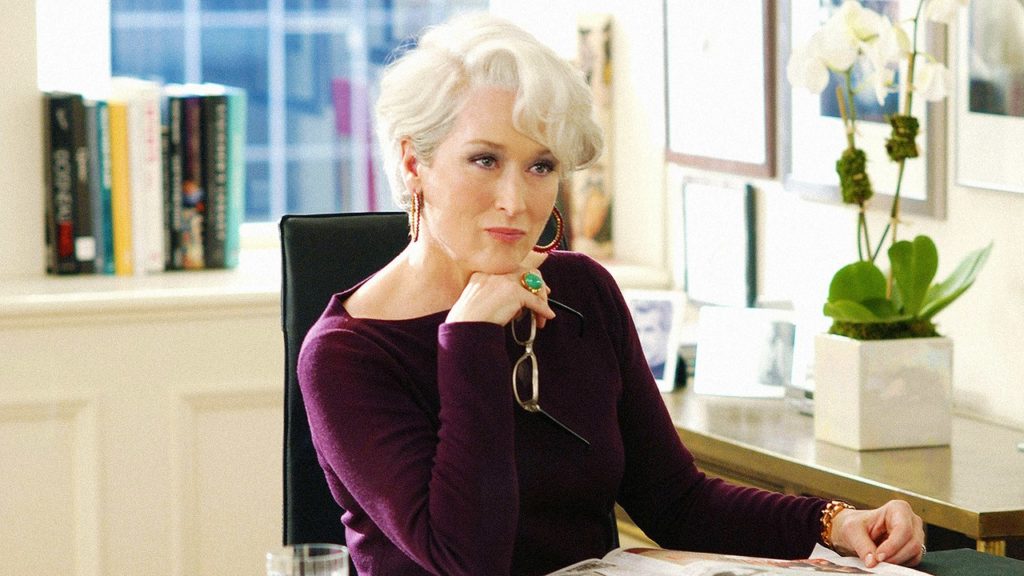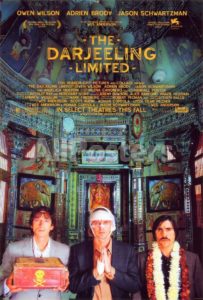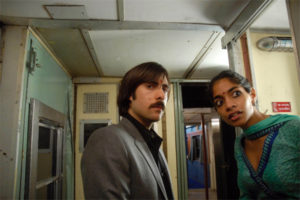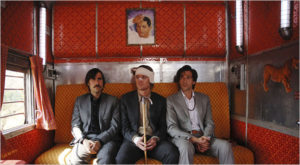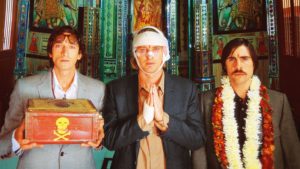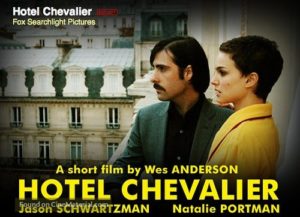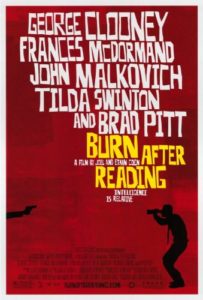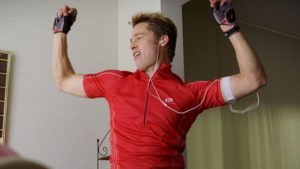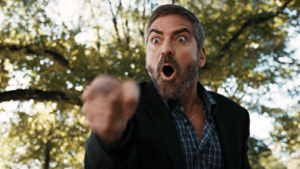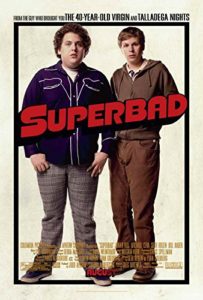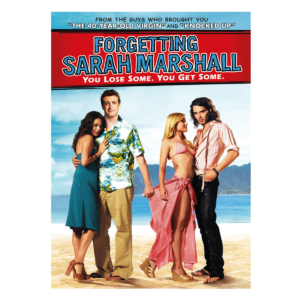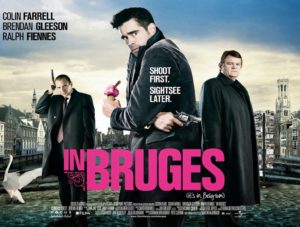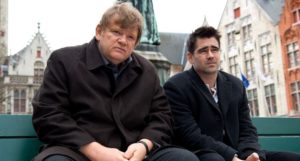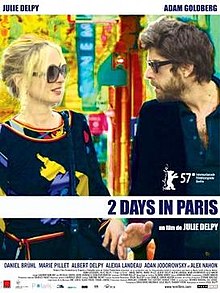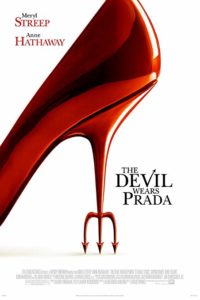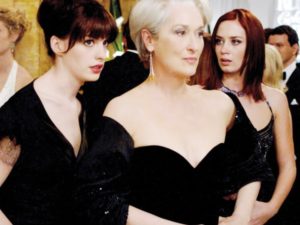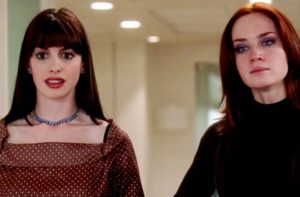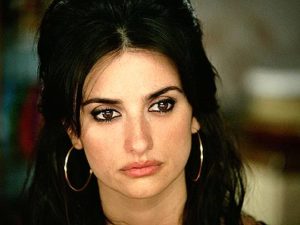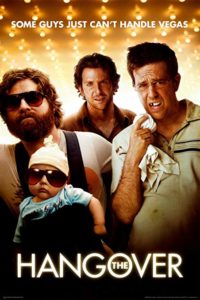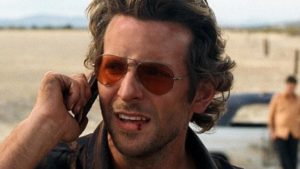From 2005 to 2009 I was a programmer on CKDU 88.1 FM in Halifax, every Sunday morning hosting The Love & Hate Movie Show. I talked about what I was seeing and revisited some of my favourite films of old, pretty much what I do now here on FITI. I still have a lot of the scripts from those days, and thought I should share them here (with some editing and updating) for archival reasons—and just for fun.
I’ve shared a few of these reviews already, going back to August 2015. Here are reviews of the first batch, films that premiered locally at the Atlantic Film Festival, a few horror titles, five-star features , a few disappointments., some charming indies, and 13 blockbusters.
Here are reviews of a few comedies.
The Darjeeling Limited
Here’s the story: We meet three brothers who haven’t spoken in a year since the death of their father. Francis (Owen Wilson) invites Peter (Adrien Brody) and Jack (Jason Schwartzman) on a train trip through India, hoping that they will be able to reconnect after a tough year of mourning—a spiritual journey to reconnect. What Francis hasn’t told his brothers is that he plans to take them to see their mother (Anjelica Huston), who is now living in India.
Peter’s wife is just about to have a baby, and Peter is feeling disconnected from her and not certain he wants to be a father. Jack has been a directionless mess, most recently he holed up in a Parisienne hotel, where his girlfriend (Natalie Portman) tracked him down.
That incident is detailed in the short film that plays in front of (,and is now available on the DVD of,) The Darjeeling Limited, called Hotel Chevalier, which I think is necessary to better appreciate Darjeeling. But more about that later.
The Darjeeling Limited starts with Bill Murray, playing the Businessman, in a very small, very speedy taxi through a city in India. Just the sight of him immediately places the film in Anderson territory for me, though it’s pretty much a cameo appearance. Then we’re introduced to the three brothers, and the story really begins.
Other Anderson hallmarks: The yellow font of the titles, the ’60s British invasion soundtrack, notably The Kinks. The camerawork, so precise, so well-framed on the train. How they managed to shoot in those enclosed spaces I’ll never know. I’ve seen clips of the actors talking about shooting on a moving train as opposed to a “studio in Burbank” so I guess they did shoot most, if not all of it, on an actual train in India.
There were some brilliant moments I really enjoyed: The need for the brothers to constantly self-medicate using strange locally-sourced potions. Francis’ assistant who he says they’ll never see, yet who is planning their entire itinerary—the actor’s name is Wallace Wolodarsky, and he’s great in a small part.
I like the brother dynamic, how they can’t keep secrets from each other. I really liked the flashback to the father’s funeral in New York, trying to collect the father’s sports car, the brothers trying to adjust to the new dynamic without their father’s presence.
My favourite moment may have been when they sit down with their mother and recount their stories, and we get a visual representation of the people in their life, all on that train, even the Businessman, who is there to represent the father.
But there were a few things that struck me as a bit lazy from the screenwriters, and that disappointed me. I have never seen a movie where a set of luggage (11 suitcases, to be precise) played such an important role in the plot, and one of those suitcases featured prominently in Hotel Chevalier as well. That they belonged to the dead father and the brothers all use them is just a bit too much heavy-handed symbolism, especially with what eventually happens to the bags.
That said, as with Woody Allen or Robert Altman or the other American director of note with the surname Anderson, Paul Thomas, you know you are going to get a certain kind of world view through his lens. I think that, after awhile, we take it for granted. If this was Anderson’s first film, we’d be probably be raving about it, but in his canon I think it’s not his best. Yet, I still very much enjoyed myself in the theatre.
So—what of Hotel Chevalier? It’s a highlight—all the little details, Jack’s insistence on playing the song “Where Do You Go To (My Lovely)” by Peter Sarstedt.
I love Natalie Portman in her role. The relationship is crystal clear—how obviously bad she is for him, how neither of them seemed to be able to help themselves. It added a lot to Jack’s character, a lot of depth. I sort of wish we had 10 minutes with each brother away from the other two, a series of shorts. That would have been great in better understanding what they’d been dealing with for their year in advance of India.
Burn After Reading
Back to kooky mode for the Coens after No Country for Old Men. Burn After Reading starts in space as we race down to Washington DC. It starts like a thriller, where it’s hard to say where the humour is going to come from.
Osborne Cox (John Malkovich) is a disenchanted, alcoholic CIA man. He quits and decides to write his memoirs. His wife is having an affair with a security advisor of sorts, Harry (George Clooney). Harry, though married, is incorrigible, and continues to seek out more female companionship, leading to Linda Litzke (Frances McDormand), a plastic-surgery obsessed employee of a health club. She and her colleague, Chad (Brad Pitt), find Cox’s memoirs and decide to blackmail him for them back. When that doesn’t work, they go to the Russians.
The Coens are so brilliant, you can’t help but be amazed at their ingenuity and general weirdness. (At one point, one of the characters invents a dildo chair.) Clooney is terrific, and Malkovich gets a wonderful part—he channels all his menace and anger, some of his best features as an actor.
But, otherwise, this is one of those goofy scripts the Coens probably write with their free time, while they think up something else more substantial. There is the feeling that they’re just amusing themselves and their friends, without really thinking much of the audience.
Pitt and McDormand, who play the dumbest characters of a very dumb bunch, are utterly one note—you have no sympathy for them at all. Some key moments take place off screen, which is annoying, as it was a little in No Country for Old Men. There’s a certain smugness here that defies what I consider satisfying storytelling, no matter the genre.
I’d include Burn After Reading with other, lesser Coen efforts, such as The Man Who Wasn’t There and Intolerable Cruelty—diverting, the product of brilliant filmmakers, no doubt, but an offering that can’t be counted among their best comedies, Raising Arizona or The Big Lebowski.
Superbad
I went to see this riding the wave of hype, all the flattering comparisons to Fast Times at Ridgemont High. The director here is Greg Mottola—who made The Daytrippers, a great, underappreciated comedy/drama—and the writers are Evan Goldberg and Seth Rogen, also produced by Goldberg, Rogen and Judd Apatow, who, of course, wrote and directed Knocked Up.
Here Mottola looks at the lives of three high school seniors, Evan, Seth, and Fogel (also known as McLovin) one day and a night in the weeks before they graduate. They go to school, they get out of school, they try and score booze for a party. One gets caught up with two outrageously irresponsible cops (Rogen and Bill Hader) and the others get sidetracked in their efforts to find more alcohol, eventually leading up to the party, the drunken girls, the inebriated fumblings. In between lie tracts of dialogue, lots of it incredibly vulgar, but I have little doubt a lot of high school guys are like this. It’s also about the bonds of male friendship, and an understanding and growing maturity over what it means to be responsible and thoughtful about the feelings of your friends. But mostly it’s a lot of jokes about penises and vaginas and awkward situations between boys and girls of a certain age.
The young actors acquit themselves very well, Jonah Hill and Michael Cera as Seth and Evan, and Christopher Mintz Plasse as Fogel/McLovin, carry the movie. It’s important you believe these guys in their roles, and credit to the casting that we absolutely do. And big props to the ladies, too, including Emma Stone, despite the fact this is the boys’ story, so we only really get to see them reacting to the guys’ weirdness. Also good to see in cameos from Kevin Corrigan and David Krumholtz in a slightly older party scene.
So, yeah, over all, an above-average take on a genre that needs more of that kind of thing, this R-rated comedy can’t be seen by the very people it’s about. I bet the teenagers will be the first ones renting it when it comes out on DVD.
Forgetting Sarah Marshall
Here comes the latest comedy from Judd Apatow and his cronies. Last year they gave us Knocked Up, Superbad, and Walk Hard, this year we got Drillbit Taylor and now this one, and there are more coming. One does get the feeling that now that Apatow’s touch is a guaranteed moneymaker, he can get anything made, and even his buddies, like Jason Segel here, who wrote the script, are getting their shot in the spotlight. This feels like a script they had in a drawer—they’re dusting them off and capitalizing on the brand, throwing them up on the screen.
I liked Segel with the supporting role in Knocked Up, saying all the inappropriate stuff. And I begrudgingly laughed at a number of his jokes in this movie. But it’s nowhere near as funny as Knocked Up, or as funny as Superbad. The problem I think is in the casting. Segel’s kind of the straight guy in the movie, but he made me yearn for guys like Steve Martin or Kevin Kline, people with real physical gifts but who can also bring the dramatic when necessary. Clearly those guys would be too old for this role now, but where are their successors?
Anyway, the story has Peter getting dumped by his longterm girlfriend, TV star Sarah, the delightful Kristen Bell, all while he’s buck nekkid. That he goes for the full frontal I guess is surprising, but it’s not really that funny, and Ms Bell was a lot more engaging as Veronica Mars. It’s really a shame more of her talent isn’t on display in this film.
Fortunately, we get British comedian Russell Brand as her new boyfriend, and rock star, Aldous Snow, the best thing in the movie. Peter finds him and Sarah in Hawaii, sort of by accident. They all stay at the same hotel, and Peter gets to know the staff and a few of the people nearby, including Mila Kunis, who works the front desk of the hotel. She’s a great deal less irritating than her character in That 70s Show, and a charming screen presence here.
There’s also a few really funny bits on Sarah’s TV show, one of those procedurals so popular on TV at the moment where Billy Baldwin is her partner. I would have enjoyed more of that. Instead, we get a lot of support from more Apatow regulars, like Jonah Hill and Paul Rudd, much of which just lies there.
It’s really hit and miss. I would say that 25 percent of the jokes are funny, but when they hit, they hit. Then there are a lot of other vaguely amusing moments, but a solid comedy throughout that does not make.
This is a perfect example of a film that would probably benefit from being seen on DVD when your expectations are a little lower.
In Bruges
Two Irish hitmen (Brendan Gleeson and Colin Farrell) arrive in Bruges, Belgium, a beautiful medieval town. They’re laying low after a botched hit where Ray, the Colin Farrell character, accidentally killed an innocent.
Ray and Ken wander around this beautiful town sightseeing. Ray quite reluctantly—he’s not impressed with what he’s seen of Belgium and wants to have some fun. He meets a woman working on a film production shooting in the town, but things don’t go well. Meanwhile, Ken is informed by his boss, Harry (Ralph Fiennes), who doesn’t show up until the third act, that he has a job to do while in Bruges.
The film is a pretty straightforward little story that uses the picturesque surroundings of the town very well. This movie is all about dialogue and location. If you’ve never been to Bruges, you will feel as though you have after this film. You also won’t be surprised that writer-director Martin McDonagh (who years later would do Three Billboards Outside Ebbing, Missouri) comes from a theatre background—this feels like it could be a play.
Though it is a hitman movie, its own weird little thriller genre, it offers a host of fairly non-politically-correct comedy suiting the emotionally stunted characters.
Ken is the most grown-up of them all, but really, they’re all little boys in a fairytale land, trying to live up to some sense of honour without the emotional skills it requires of them. That sense of fantasy is carried over onto the other characters in the film and the movie set they stumble upon. In many respects I would compare the film favourably to Sexy Beast, with Ralph Fiennes as the Ben Kingsley character. It’s not as dark as the previous film, nor is it as surreal, but it has something in common in the foul-mouthed, violent cockney Brits in Europe set-up.
In the end it does seem to go a bit too far out with its dramatic plotting, but I went along with its shifts and changes because by then I was attached to the characters. Colin Farrell is perfect in his role, and I also thought he was great in Miami Vice, too, so I guess I’m a fan.
2 Days in Paris
Julie Delpy wrote, directed, produced, edited and composed the music for this film, and stars in it. It’s her baby, and it’s quite good—a charming, Woody Allen-esque look at the complications of a relationship with a sharp sense of place.
Delpy and Adam Goldberg play lovers, Marion and Jack, two years into a relationship, just returning from a vacation in Venice on their way back home to New York. She’s an outspoken woman, narrating the story. He’s Jewish, a slight hypochondriac, drawing more parallels to the Allen template. They stop in Paris for a couple of days to visit Delpy’s folks, played by Delpy’s actual parents, who you may recall had cameos at the end of Before Sunset.
There are quite a few similarities to Richard Linklater’s amazing sequel: The Paris locations, where Linklater used steadycam, Delpy prefers hand-held. The couple in constant conversation, but where Linklater’s film was more cerebral and existential, this is messier, it feels more improvised. Less about ideas, more about raw feeling and insecurities.
As the two days go on, there are plenty of chances for humour, capitalized on by Delpy and her cast. I loved when Jack sends a group of right wing Americans on a wild goose chase to find the Louvre, and the scene at dinner with Delpy’s parents’ is priceless.
As it goes along more of Marion’s ex-boyfriends keep showing up, and the differences between French and American culture are very well defined. What surprises is Delpy’s script is more critical of the French than the American—Jack is far from a two dimensional Ugly American, and while he does have some of those qualities, his growing distrust of Marion and his inability to entirely understand what’s going on with her exes isn’t wildly out of line. It makes sense, and when she lies to him to “spare his feelings,” it does seem that she’s the immature one, unable to quite see where he’s coming from—she’s the one getting into fights in cafes. It’s possible women out there might disagree with me on this one.
This is confident filmmaking, especially when you consider all the hats Delpy is wearing.
The Devil Wears Prada
This is the film based on the book by Lauren Weisberger, who famously worked for Anna Wintour, Vogue editor with a legendarily “difficult” personality. Weisberger has denied that the Meryl Streep character in this film is based on Wintour but, you know, that’s very hard to believe.
Streep plays uber-intense fashion magazine editor Miranda Priestly, who is looking for a new second assistant. Anne Hathaway plays Andrea, a Midwestern journalism student in New York to be a writer who takes the assistant job to pay the bills. Of course, she’s a bit of a slob. Well, truthfully, she dresses like just about everyone else, but she gets the job despite having no interest in fashion. She’s treated like a subhuman because of this, especially by Priestly and her first assistant, Emily, played by the amazing Emily Blunt, who was so good last year in My Summer of Love. She’s excellent in her first Hollywood role, very believably nasty.
So, Andrea, or Andy, works hard to try and put up with all this workplace toxicity, eventually learning that even if she screws up, if she looks better and wears the haute couture herself, she’ll at least get a modicum of respect for having taste. She finds an ally in Stanley Tucci’s Nigel, a designer at the magazine. He’s very good, as always. Andy’s boyfriend, Nate, played by Adrian Grenier of Entourage fame, starts to get annoyed at how Andy is changing for her work, as if his job as a sous chef wouldn’t keep him too busy to even care. This is New York, people. In order to even live there you have to make incredible sacrifices, including missing your boyfriend’s birthday, maybe. Andy’s friends and lover are very thinly sketched.
But that’s OK because La Streep is awesome. Here is yet another character we’ve never seen her play, though there are shades of the power-hungry political mother from The Manchurian Candidate. Her Priestly is astonishing and very real, and she grounds the movie from being total fluff. Hathaway is fine in her part, and then we get Andy looking amazing in those clothes, and the glamour of her job starts to appeal to her. Plus, she starts to see these nasty people as human beings, which is all fine.
But as a satire, it’s absolutely toothless. It’s too in love with the fashion world, and expects we will be too. The problem is, as it comes down on the side of fashionistas and their obsessions, it forgives all their terrible behaviour, basically saying that underneath, they’re really not so bad people. It’s a limp argument. Good taste and success are no excuse for treating people like crap, no excuse for being mean. This audience member was frankly annoyed when the picture decided to go that way, because I think if you sacrifice for success, fame, and beautiful clothes and it destroys your relationships and you become a corporate climbing, soulless automaton, you don’t get any sympathy. It’s your own bloody fault if it leads to your relationships crumbling.
And maybe Andy comes out a bit smarter at the end for walking away from it, but her finding forgiveness? I don’t buy it.
Volver
Pedro Almodovar’s previous work is well admired internationally: I’ve read some calling him the best director working in Europe today. There’s no doubt he has a distinct voice, and though I wouldn’t call myself a huge fan of his work, there’s no doubt he has a unique vision. His films are incredibly chaotic, full of colour and passion and sex and event and joy and tragedy. He makes very watchable Spanish melodramas.
Penelope Cruz is amazing in Volver I’ve never found her entirely convincing when she acts in English, but in this she entirely inhabits her character, the voluptuous, swaggering and driven Raimunda, one of two sisters dealing with the sudden death of their aunt. The aunt was an older woman who lived in their home village and who believed her sister, Raimunda and Soledad’s (Lola Dueñas) mother, was taking care of her at the end, even though the younger women know their mother died in a fire. But the ghost of their mother does appear, but only visible to Sole. Meanwhile, Raimunda’s husband Paco tries to molest Raimunda’s 14-year-old daughter Paula, and winds up with a knife in his belly for his trouble. Raimunda stores the body in a restaurant freezer, which she must dispose of, with the help of other women in her Madrid neighbourhood. The plot never stops for a second before something else happens to change the dynamics, while it’s all held together by the excellent performances.
Almodovar is always writing the best parts for his female actors. This I think is one of his lighter, funnier works, and delightful in so many ways.
The Hangover
Todd Phillips is the director of some pretty funny lowbrow Hollywood comedies Old School and Road Trip, and a couple of pretty bad ones, School for Scoundrels and Starsky and Hutch. This is definitely a return to form for Phillips, a broad, bachelor-party comedy that delivers consistently funny dialogue, characters and comedic situations throughout. Even though it does go a little slack in the final act, the overall experience is as solidly funny as any mainstream comedy I’ve seen in ages.
Doug (Justin Bartha) is about to be married to Tracy (Sasha Barrese). Doug and his two best buddies, Phil (Bradley Cooper) the lothario school teacher and Stu (Ed Helms), the cuckolded dentist, who has to lie to his girlfriend about the buddies’ plans—they conspire to take Doug to Las Vegas for a big blow-out bachelor party. Part of the deal is they have to bring Alan (Zach Galifianakis) along, Tracy’s brother, a very socially awkward dude who tends to say inappropriate things at regular intervals.
The set-up is great. We get time with each of the men as they head out from LA to Vegas, and we get to know the friendly dynamic between them. This is definitely not the miserable Very Bad Things—they’re very believable friends and a likeable bunch. So, they check in to Caesar’s Palace hotel and get dressed for a night out on the town.
Cut to the morning after: their hotel room is destroyed, but they’ve got a chicken, a tiger, and a baby in the room with them. No one can remember what happened the night before. Stu is missing a tooth. And Doug is missing altogether.
What follows is a dizzying day tracing their steps back, discovering the evidence of the crazed behaviour of the night before. It’s an entertaining puzzle, as things just get weirder and weirder. You start to see that these guys are just barely adults, that even hung over and sober they’re prone to bad decisions.
I won’t tell you any more of the plot, as the humour is definitely inlaid in the discoveries of what they are capable of when inhibition is set aside. Some of it is a little obvious, and as the plot kicks in, involving a Chinese gangster, $80,000 dollars, Mike Tyson, and one of their number marrying a stripper, some of the laugh-a-minute gags of the first act disappear to be replaced by a frenetic pace and too much plot. Still, the final outcome works out pretty well, and culminates in an end credit sequence that had me laughing out loud again and chuckling thinking back on it.
It’s great to see Heather Graham in the movie, as she’s a comedic actress of some talent who hasn’t had the kind of career Boogie Nights suggested she might have. But, in fact, there isn’t a female character who isn’t a stripper or a shrewish girlfriend or fiancé, and that’s certainly problematic. But it is the story of these guys and their experience, and it gets that mostly right.
So, yeah, in the final analysis, it’s not above and beyond the mainstream genre in which is sits, but it’s still a very fine example of it, and I suspect it will be a smash success and it might finally make Bradley Cooper a household name. (2019 note: that was a decent prediction.)





